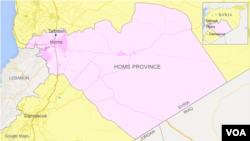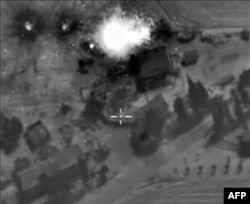Twenty-eight civilians, including women and children, were killed Wednesday in Russian airstrikes in Syria, an opposition monitoring group claimed.
The airstrikes, which are Russia’s first military action outside the former Soviet Union since the occupation of Afghanistan in 1979, appear to be the start of a long-haul commitment by the Kremlin to shore up the regime of Syrian President Bashar al-Assad.
Russian officials dismissed claims civilians were killed Wednesday in the 20 sorties that struck eight targets mainly focused on Rastan, Talbiseh and Zafaraniya in Homs province. A further four targets were struck in sorties overnight Wednesday.
“Biased and false reports have flooded Western and regional media, claiming the Russian military operation is causing civilian deaths or even is aimed against pro-democratic forces and the peaceful population,” said Mariya Zakharova, spokeswoman for the Russian Foreign Ministry.
Russia television
The Kremlin-controlled Russia Today television channel accused Western media of adopting uncritically a “Russia is the villain” narrative and claimed photographs of casualties posted online by rights groups were old and predate the Russian airstrikes that were carried out by Su-24M and Su-25 ground attack warplanes, which flew from the Bassel al-Assad Airport in Syria's Latakia province.
The Syrian Observatory for Human Rights, a London-based monitoring group that relies on a network of political activists in the war-torn country, said it documented 28 civilian deaths, including five women and six children.
The Syrian National Coalition, the Western-favored political opposition group, claimed 38 non-combatants had been killed.
In a statement, the coalition slammed Russia for conducting the airstrikes, dubbing the raids “brutal” and accusing Moscow of failing to abide by its commitments to the Geneva Communique, “which prohibits the escalation of violence and calls for taking action to reduce violence.”
It added, “The Russian airstrikes, which killed about 40 people today, together with reports about Russia deploying special military units to military facilities and air bases in Syria in preparation for ground operations, represents bold aggression. ...
"While they reinforce the belief that Moscow has become a partner to the Assad regime in committing war crimes and crimes against humanity and against Syrians, they undermine Russia’s claims about seeking a political solution. Russia is in fact propping up a crumbling regime that has lost all legitimacy to rule," the coalition statement said.
Western criticism
The statement echoed U.S. and Western criticism of the Russian military intervention.
On Wednesday, U.S. Defense Secretary Ash Carter said Russia’s decision to launch airstrikes in Syria is “tantamount to pouring gasoline on the fire" of that country’s four-year civil war.
Carter also said the Russian airstrikes in Syria hit villages “probably” not containing Islamic State extremists, but occupied by anti-Assad rebel groups.
Russian officials insist the Islamic State group was the target of the air raids and claim they destroyed the terror group’s weapons and fuel depots as well as command centers.
Syrian activists in Homs dismissed the Russian claims, saying the bombing was on other rebel groups, mainly Islamist rebel militias, and at least one brigade that has been supplied with arms by the United States.
“Wednesday’s strikes proved that Russia’s target in Syria is not IS, but the anti-Assad rebel groups,” said Saleh al-Zein of the Islamist al-Shamia Front. “They are striking our rebel forces under the pretext of fighting IS,” he said.
Russian Defense Ministry spokesman Major General Igor Konashenkov told reporters in Moscow the air raids were pulled together quickly, within hours of the Russian parliament approving the use of force in Syria.
“It was possible because we had most of the material and ammunition ready at our depot in Tartus. We only had to move our aircraft and deliver some extra equipment,” he said.
'Over the long term'
The apparent upgrading of the Tartus naval base in tandem with Russia’s air operations “suggests a decision by Russian leadership to prepare for further support over the long term to the Syrian regime,” according to a research note by the Washington based Institute for the Study of War.
“The expansion of the naval facility at Tartus also reflects Russian intent to secure permanent strategic basing in Syria in line with its establishment of an airbase at Bassel al-Assad International Airport," the researchers say.
Anti-Assad rebel commanders say they are alarmed at the buildup of regime regular and irregular forces in the province of Hama, where Russian warplanes also struck.
They suspect government forces will unleash a ground offensive on al-Ghab plain in a bid to rollback insurgents.






